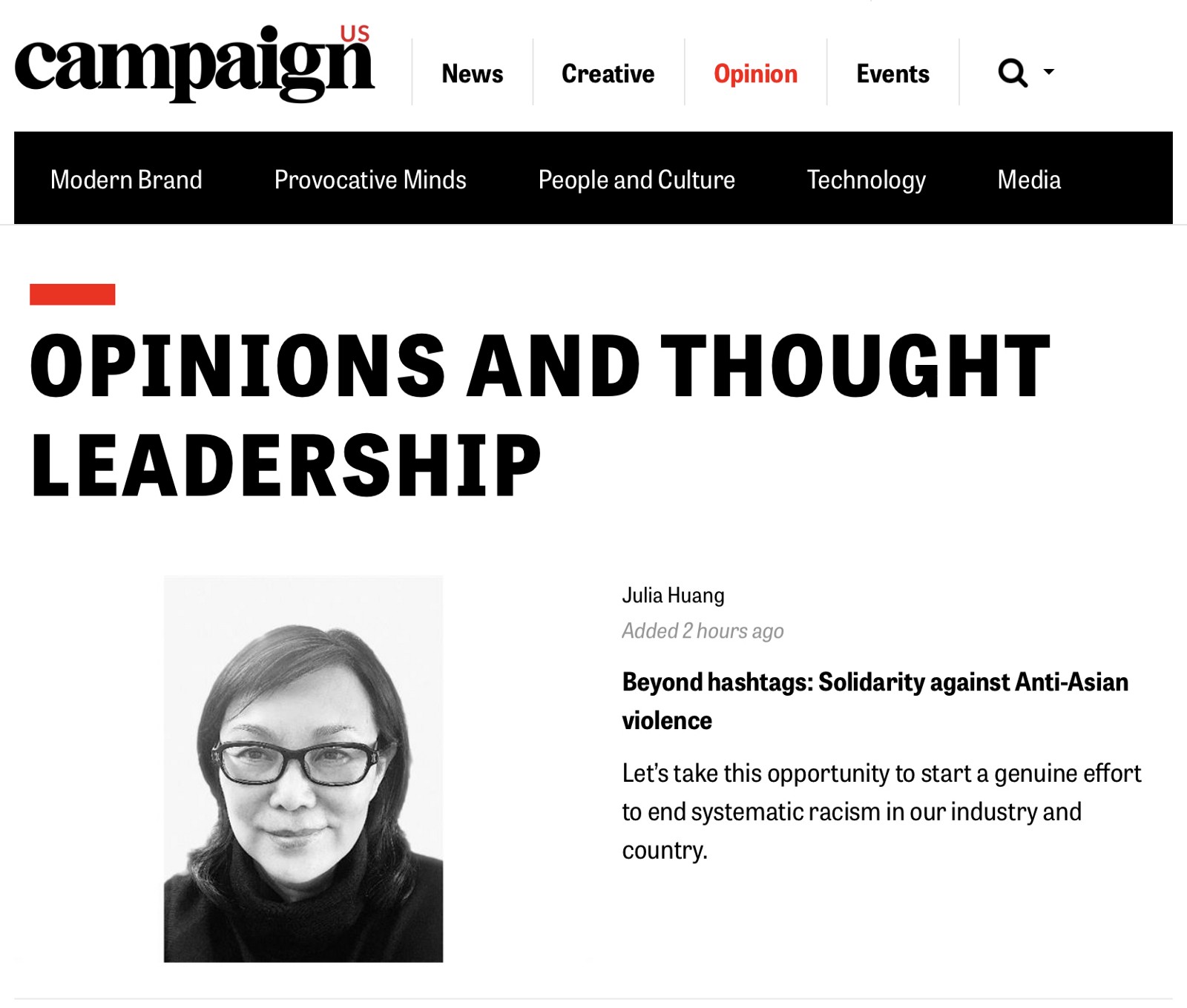Solidarity against Anti-Asian Violence by action, beyond hashtags

The past several years haven't been easy for our industry.
In an environment where kneeling respectfully for one's belief and wearing a mask for public health can attract outcries, where lip-servicing patronizing support can be called out, it is not surprising that the ad industry stays neutral by remaining silent. We are used to acting as brand stewards, relying on measuring success on positivity quotient, KPI, and ROI. We are trained to guide the brands to shy away as much as possible from controversy. However, as events of social and racial injustices refuse to disappear from the headlines, brands have been demanded to take a stance. Since then, agencies and brands have been pledging their commitment to addressing race, equity, and inclusion not because more products or services will sell; but because we will be standing on the right side of history by doing so. Such a decision should be a no-brainer, but the process is far from being on auto-pilot.
By now, it is well documented that since the pandemic hit, close to 3,800 hate incidents against Asian Americans have been reported from March 19, 2020, through February 28, 2021, which is definitely an under-reported number. It reached a horrendous crescendo on March 16, when a mass shooting in Atlanta killed eight people, six of whom were Asian women.
As the head of Intertrend, an Asian American communication agency, the helpless rage I have been feeling has been heavy. To say that we had to come out of our comfort zone is an understatement. Personally, I have had to push myself to "stand up and speak up," an easy enough hash-tagged slogan to have on a placard but taxing to act upon.
The condemnation of violence and support from the industry for #stopaapihate was swift. While we appreciate the strong statements of solidarity, denouncing violence and hate should never be difficult. What happens after another headline takes over the current one and, as horrific as these crimes against Asians are, fade from our memories?
Last year, we started an initiative called Make Noise Today to advocate Narrative Plenitude - to stop Asian American stories from conforming to only how we are perceived, relying on monolithic narrative to shape our identity. It is necessary to work ourselves out of Narrative Scarcity: to combat racism by amplifying our stories of heritage and accomplishments, challenges and grit, inspiration, and culture. We deliberately focused on empathy building rather than the hate around us through storytelling. Yet the "stories" we have had to tell the last few weeks through our full pages ads in newspapers such as NYTimes and wild postings to #StopAsianHate and call for unity has been heartbreaking. We must recognize that we are in a collective battle against systemic racism that affects us all. It is essential that Asian American experiences be included in that conversation.
My call to action to our industry is this: start to unlearn the hierarchical way we look at multicultural markets. We cannot prioritize one race over another to achieve social justice. If you are already having a conversation within your organization and clients regarding eradicating racial injustice, make sure Asian American voices are included and heard. This mandate must come from the highest level of any corporation. The most significant step we need to take for the changes to happen is to work together at the same table.
Over eight years ago, one of our clients unveiled a unified, integrated marketing model to engage a more diverse U.S. population by bringing all agency partners under one umbrella. In a continuously pivoting process, one thing has never changed; all agencies were included in the marketing decisions from day one. There was no separation between a multicultural market and the so-called general market. Meetings were conducted with everyone at the table, with no single dominating voice. The process is not easy. Discussions are often uncomfortable. This partnership model could have gone wrong in so many ways if the client directive was unclear and agency partners were distrustful of each other. While efficiency might sometimes be sacrificed, we gained by giving equal voices to everyone, striving to be an ally to each other to achieve a common goal. Working in unity for common goal works.
As we are still reeling at all the possible ramifications from the waves of crime against Asian Americans and other marginalized communities, we should see this as an opportunity to start a genuine effort to end systematic racism in our industry and country.
Poet and author Cathy Hong Park wrote:
"And so silence collects, becomes amplified, takes on a life outside our intentions, in that silence can get misread as indifference, or avoidance, or even shame, and eventually this silence passes over into forgetting."
Together, let us not be silent anymore.